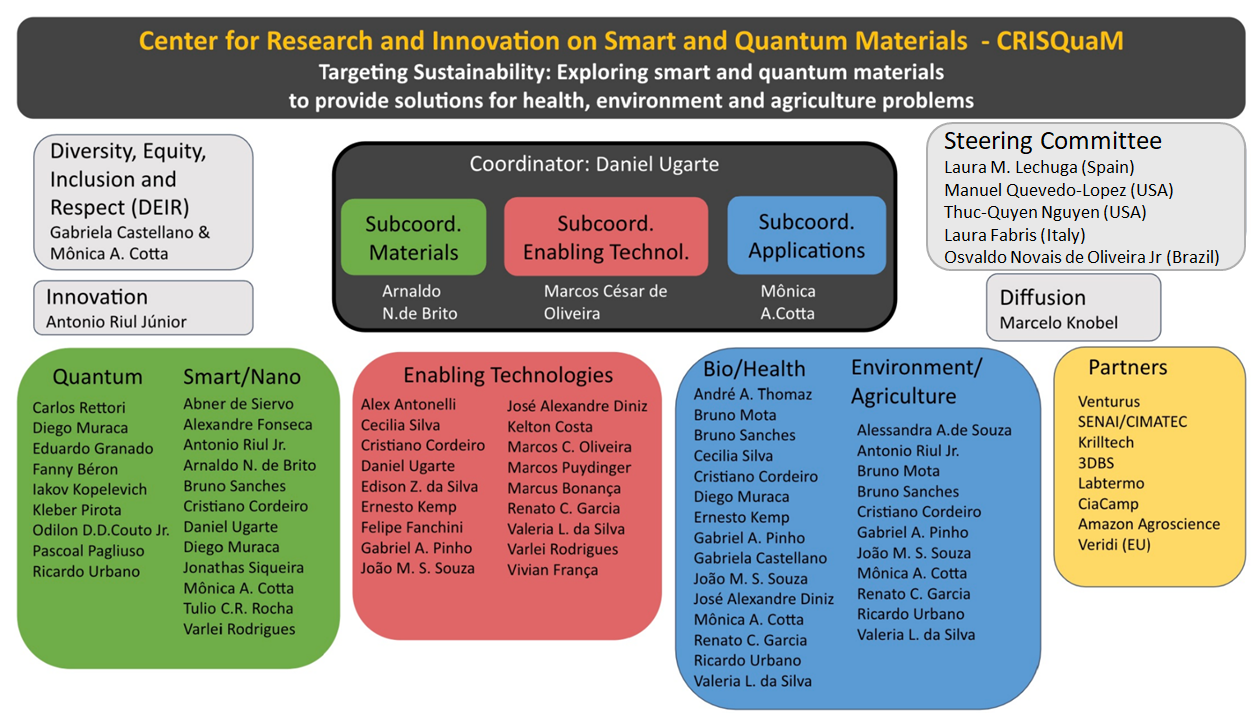BV-FAPESP: research projects supported in this Center
CRISQuaM in the Media: news about the center
CRISQuaM aims to explore the synergistic development of fundamental and applied science to create new materials with high potential for the construction of devices and sensors to address technological challenges related to sustainability, climate change, precision agriculture, ecology, and health. To achieve these goals, we have assembled an interdisciplinary and collaborative research team, integrating expertise across various scientific domains, researching novel materials with high innovation potential. By combining original synthesis methods, advanced characterization techniques, theoretical approaches, computational simulations, quantum technologies, and device construction designs, we aim to drive advances in smart and quantum materials, promoting scientific excellence and technological development. With this, we plan disruptive innovations in instrumentation—including hardware and AI-based tools—as well as in quantum technologies, biomedical devices, and signal processing, in addition to plant bionics, exploring plant-pathogen interactions. Besides research activities, we plan intensive actions in education, dissemination, and communication for the general public, as a modern society should be aware of the challenges humanity faces and how research and technology are essential for responsibly utilizing the planet's limited resources. CRISQuaM's Innovation activities are accelerated through partnerships with several companies in related technologies, many of them Brazilian. Finally, all activities of the Center are managed in accordance with diversity, equity, and inclusion goals and best practices.
The Center brings together scientists, engineers, and innovators in a collaborative effort to apply materials science and quantum technologies at the cutting edge, designing new materials and nano(bio)sensors for advanced diagnostics. The Center has a team capable of producing a wide range of (nano/micro) materials, along with precise chemical and physical characterizations using modern techniques (synchrotron, advanced microscopy, magnetotransport, magnetic resonance, optics, etc.). In addition, the team offers various options in enabling technologies, including miniaturization, processing, and additive manufacturing, as well as instrumentation, quantum sensing, and electronics development. Data analysis will employ updated approaches (numerical simulation, classical and quantum machine learning, and quantum optimization). Applications at the knowledge frontier will address urgent sustainability needs in environmental areas, precision agriculture, plant bionics, and biomedical interfaces, contributing to the development of local technologies in close partnership with the Brazilian industry.
The organization of the Center is based on three pillars — Materials, Enabling Technologies, and Applications — together with partner companies, as described in the figure below.

2023-10-18
Plant species native to the Brazilian savanna-like biome grow thick bark to protect their internal tissues and hide organs that assure resprouting below the ground, according to an article in Flora by researchers at São Paulo State University.
2023-10-16
The calls offer opportunities for accelerators and agencies that provide services for startups under the aegis of Tecnova III, a program run by the Brazilian Innovation Agency which in São Paulo is operationalized in partnership with FAPESP.
2023-10-11
In addition to helping combat antimicrobial resistance, the bioparticle developed at the Federal University of São Paulo avoids the waste and pollution created by excessive amounts of drugs in water bodies. The strategy was tested on an ornamental fish species native to the Amazon and found to be safe.
2023-10-11
Record levels of destruction of native vegetation in the Brazilian savanna, the second-largest biome in South America, motivated the letter published in Nature Sustainability. The scientists who wrote it stress the need for specific measures to conserve the Cerrado’s rich biodiversity.
2023-10-11
Dutch-born scientist Martinus Theodorus van Genuchten is the author of a famous equation describing the hydraulic conductivity of unsaturated soil. His discoveries are central to agricultural operations and climate science, and he recently won the prestigious Wolf Prize in Agriculture.
2023-10-10
Research conducted at the University of São Paulo involving 95 volunteers associated poor sleep quality with a deterioration in the complications caused by aging and overweight, such as anxiety, depression, body fat gain, and loss of muscle mass and strength.